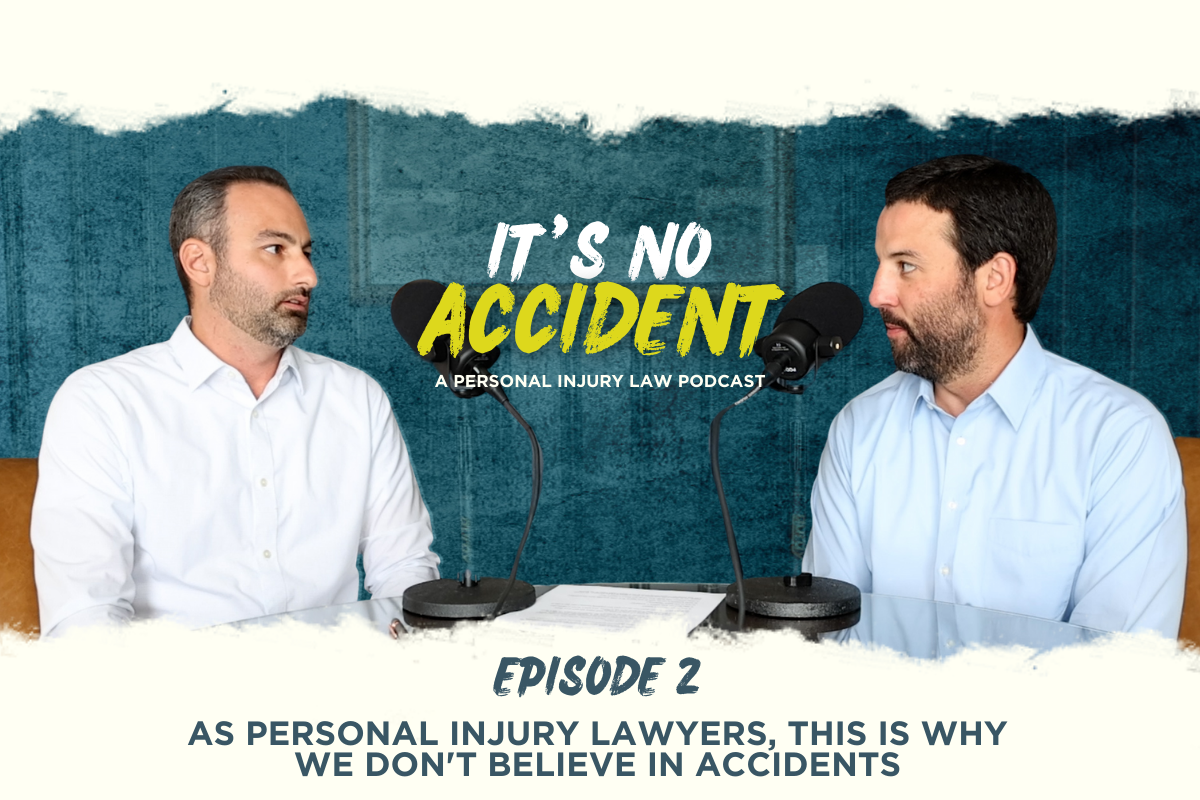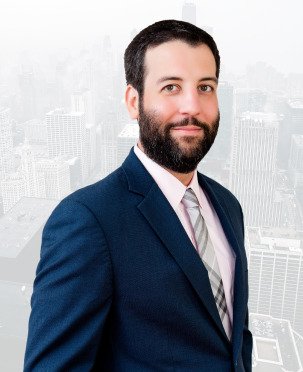
In this episode of “It’s No Accident”, Tallahassee Personal Injury Attorneys Mark Nonni and Jaeson Homola discuss why they don’t believe in accidents. More than just a slogan, this philosophy shapes how Nonni Homola tackles personal injury cases from the first consultation to the courtroom. During their discussion, Mark and Jaeson also dive into what the meaning of negligence is and why there is no case without a provable injury. If you’ve suffered an injury from a car crash, slip and fall, or any other incident, this conversation can help you decide whether it’s time to call an attorney.
Episode Transcript
Nonni
Welcome to “It’s No Accident”, a podcast about the challenges of personal injury and wrongful death law in Florida, one of the nation’s most complex legal environments.
Homola
You’ll hear compelling stories about real cases from our law firm in Tallahassee, that will help you better understand your rights and protect yourself from the negligence of others
Nonni
I’m Mark Nonni.
Homola
And I’m Jason Homola.
Together
And this is, “It’s No Accident.”
Nonni
The title of this podcast is “It’s No Accident”, and I think it’s because you and I both believe that for the most part, there are no accidents.
I think you and I really try to delete the word accident from our vocabulary. Why do you feel that way? I mean, I know we feel similar about it, but what do you think about when you hear the word accident?
Homola
I’ve tried to. I still say the word accident every time I say it. It’s like a four-letter word for me. Every time I say it, I’m like, I’ve got to get that out of my vocabulary. And it’s tough because, you know, you see, there are some billboards in Tallahassee right now that say, I mean, almost half the size of the billboard that says accident. Right? So, you know, it’s a word that is somewhat married to personal injury law.
But at the end of the day, I hate the word because it’s kind of become a cop-out in our vocabulary. It’s like you’re in an auto wreck and it’s kind of throw your hands up in the air like “It was an accident. I didn’t mean to do that. It’s just an accident.”
But in what we do every day, you know, what you got to do is you got to ask the question, You know, “Why did that happen?” And when you start asking those questions about why it happened, you know, you start seeing that, you know, in the work that we do, there really aren’t any accidents.
If someone rear-ends your car and they say, well, you know, “It’s just an accident”. “Well, what do you mean it’s just an accident? Like you just you just drove into the back of my car, like, what were you doing?” And you start asking those questions and you start to realize that, you know, people are distracted when they’re driving.
You know, they’re fiddling with their radio, They’re texting, maybe had a few too many drinks at the bar, and you left, your attention wanders over to something in the distance and you end up hitting somebody and there’s a reason why these things happen. And, really it’s negligence.
It’s not an accident. It’s negligence. You aren’t paying attention to what you were supposed to be doing. And, you know, my mom always told me when I got my driver’s license that you’re driving a lethal weapon on the road. And if you’re not paying attention, you can really hurt somebody.
And unfortunately, in today’s world, people are texting and driving and they’re talking on the phone and they’re driving. There’s never been a time where people are more distracted. So we start to see that play itself out on our roads. And there’s there’s more accidents now than I’ve ever seen.
It’s tough to get out of your vocabulary.
Nonni
It gets ingrained, for sure. But like you’re saying, I mean just the word accident, you know, a lot of times implies that it’s no one’s fault, you know, it’s just an accident. It’s no one’s fault, which is not the case like you just described. I mean, just because someone didn’t mean to run into the back of another vehicle, it wasn’t on purpose.
It doesn’t mean they weren’t at fault. You know what I mean? It doesn’t mean that they weren’t doing something negligent like you just described. And so I think always, it gets under my skin, so to speak. And when the word accident is thrown around, there is the implication that, “Oh, it was just an accident” and that was no one’s fault.
It’s like you said, most of the time, 97% of the time in the cases we see, there was somebody at fault. Sometimes it was our client, but most of the time, a lot of the time, it was someone who was being negligent, distracted, and texting and driving or whatever, like you described.
I can’t remember when or how long ago it changed. But even on the reports that law enforcement does after a car wreck, they’re now they’re called crash reports. They’re not called accident reports or anything like that. I think at one point they were in the past, but the vocabulary has been changed in that regard, to signify that these aren’t necessarily accidents or crashes.
There’s a crash report. And that’s that’s what I try to use. I try to use the word crash or wreck. Not accident.
Homola
And you know, it’s interesting, too, because when you’re in a jury trial, before the jury trial starts, there’s always going to be a motion that gets filed. The judge is always going to rule that, you can not refer to the crash report as an accident report.
They always try to say, “Well, you know, the accident report” or something along those lines. You cannot refer to that as an accident report. And, a lot of times judges will say you’re not supposed to use the word accident in a trial. It’s almost like using the word insurance in a trial.
It’s a no, no. So it’s a word that gets used in everyday vocabulary. But we’ve really tried to try to nix it from ours.
Nonni
Yeah. I guess that kind of leads into what you and I both just kind of threw around, the word negligence a few times.
So maybe we should kind of talk more broadly about that. Like, you know, what is negligence? How do you think about it? Or when you’re explaining it to somebody, how do you describe it to people?
Homola
Well, the definition is going to be different for everybody. It’s kind of a moving target and everybody’s definition is going to be different.
The way that I define negligence is I define it as somebody acting contrary to what a reasonable person would do so in the same or similar circumstances. So if you have somebody that you’re trying to determine if they were negligent or not, my standard is (and there’s a reason why this is my definition. I’ll get to that in a second).
But you look at what a reasonable person would do in that circumstance and if what the tort fees are or the defendant did, if that falls below that reasonable person’s standard, then that’s negligence. And it’s like if somebody’s driving down the road, and they’re looking at their phone and they’ve been looking at their phone for 10 seconds and they’re driving down the road, and then they run into somebody, you look at that and you say, “Well, would a reasonable person have done that?”
And I think most people can agree with that. No, they wouldn’t have done that. They would have been paying attention to what’s going on in front of them. And because they didn’t, that’s negligence.
And that can get into a gray area because then you look at a store owner and somebody slips and falls in their store. Was it negligence that they didn’t see the water that was on the floor that had been there for 5 minutes? Was it reasonable for them to not have cleaned that up in the 5 minutes that the spill had been there? Well, you ask a hundred different people and you probably well, maybe not 100, but you have ten different people.
You’re going to get ten different answers. And that’s going to differ from a store owner might say, “Absolutely, that’s not negligence.” But if you have you have somebody that was injured and fell on that water, they’re going to be the ones that say, “Well, yeah, I mean, they should have seen and they should have cleaned it up. Why didn’t they have protocols in place to go around and look and see if there was water? So it’s kind of a moving target in that way. The reason I define it that way is because that’s how a judge is going to tell a jury. At the end of the day, the jury is the one that makes the determination as to whether or not you’re negligent.
Nonni
I was about to say the same thing. Basically what you’re describing is one of the reasons why we have the jury system for injury cases, because, like you said, whether someone’s negligent in a certain situation, people can view it differently. We have the jury to basically figure out the answer to that question, Was this person negligent or was this business negligent?
They’re the ones that are making the decision. And so, I agree. I kind of think of it, basically the same thing you said. But the way I kind of think about it or explain it to people when I’m trying to break it down is basically the concept of negligence is, either doing something that you shouldn’t have done, like you just said, you know, texting, driving, you shouldn’t be doing that. And then it causes an accident and hurts somebody. And I just said accident.
You know, you’re doing something you shouldn’t have done or not doing something that you should have done like if you’re a business owner and you got a big hole in the front, right in front of your front door, you should fill that in. And if you don’t and someone gets hurt, that’s negligence, you know?
And so it’s something that when you hear the legal definition that the judge reads at trial, it can sound kind of complicated. But when you kind of just break it down and think about it in everyday kind of scenarios, it’s pretty clear-cut.
Homola
Just because you’re negligent doesn’t mean that somebody gets hurt. At the end of the day, as I’m walking in this office and I stub my toe on something as I’m walking by it, I got hurt and I was negligent. But at the end of the day, I’m not going to make a legal claim against myself. And somebody driving down the road and texting, the example I gave earlier… You’re looking at your phone for a few seconds and you don’t hit anybody. You don’t cause an injury. You’re still being negligent. You just haven’t caused an injury. So, there’s going to be a legal claim. I mean, I think we can all agree that everybody’s probably negligent every day of their life. It’s just, you don’t hurt anybody in the process of doing it. So there’s a legal claim that a law professor just called that negligence in the air. It just happens.
You can swing a sword around in the middle of an open room and there’s nobody around and that’s negligent, but there’s no legal claim, you didn’t hurt anybody. But as soon as you put 15 people in that room and somebody gets hurt, you get a legal claim.
Nonni
No, you’re right.
I mean, it’s funny what you just said reminds me of something that I think we see all the time, especially in medical malpractice cases. Basically, the concept you just said, is if it’s possible for someone to be negligent but not hurt anybody. And if there’s no injuries, then there’s no case.
And we both get it all the time where people something happens at the hospital or the doctor’s office where maybe the hospital or the nurse or the doctor or whoever really did mess up, you know, and they were negligent.
But thankfully, luckily, the person didn’t get hurt. And so I know you and I have spent a lot of time over the years explaining to people that “I’m sorry, the doctor should have done that. That shouldn’t have happened to you. But you didn’t get hurt, so you don’t have a case. And a lot of times people just don’t understand that because they’re like “Oh, well, the doctor was negligent.”
It’s like, “Well, yeah, but if you’re not hurt…These are personal injury cases. So, if you have no injuries, there is no case.”
Homola
The response we get to that all the time is “I could have died!” And yeah, you could have died. And I understand that. And I understand that you’re mad, you’re pissed off. But at the end of the day, if there’s no real damages, there’s no real injury, you don’t have a case.
Nonni
Well and the law doesn’t count for could ofs. We need actual, real injuries. Not, you know, could of this, could of that, you can’t bring that in front of a jury at a trial.
Those kinds of arguments… The could ofs.
Homola
I guess you could. You’re just not going to get really far.


